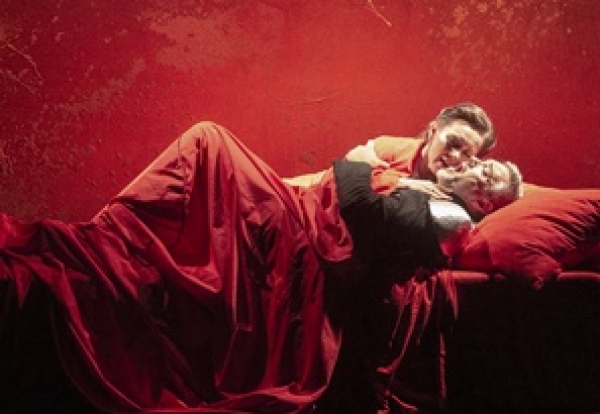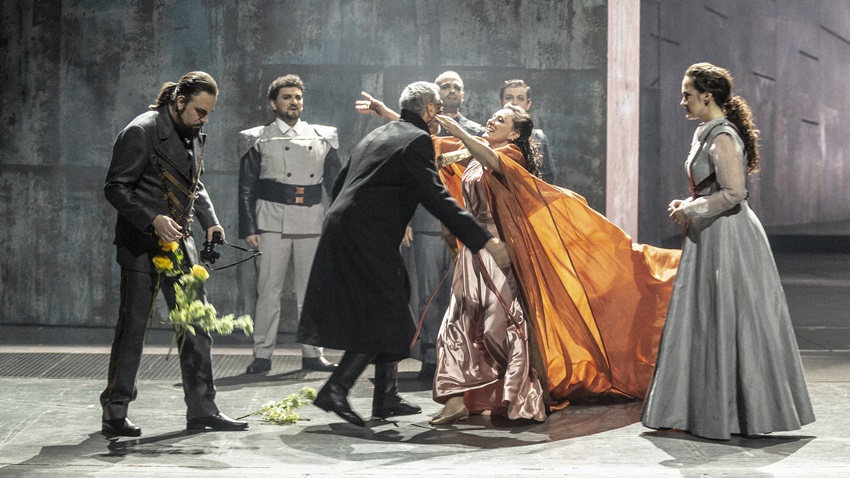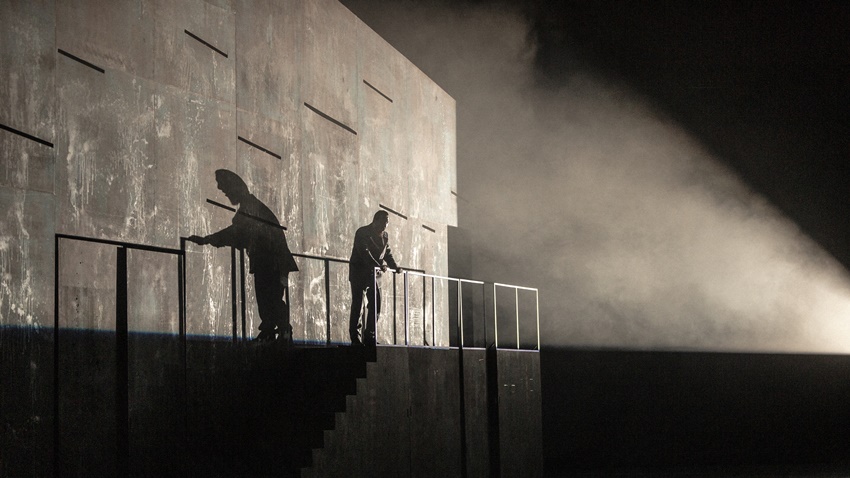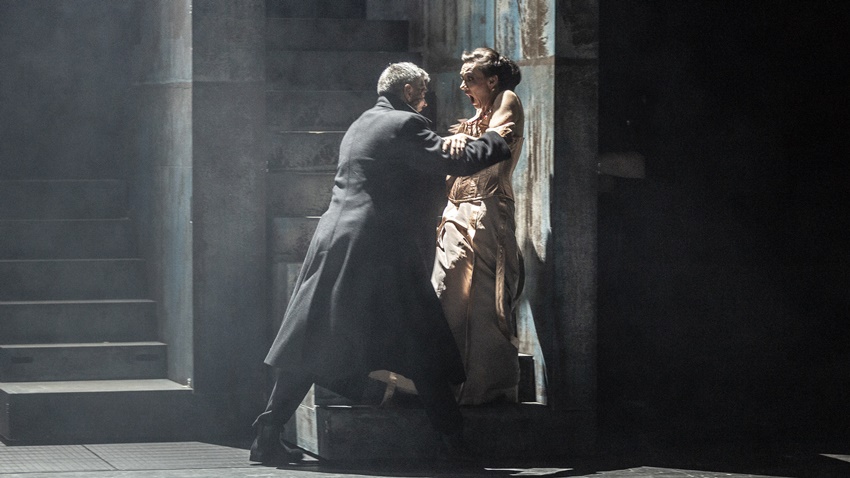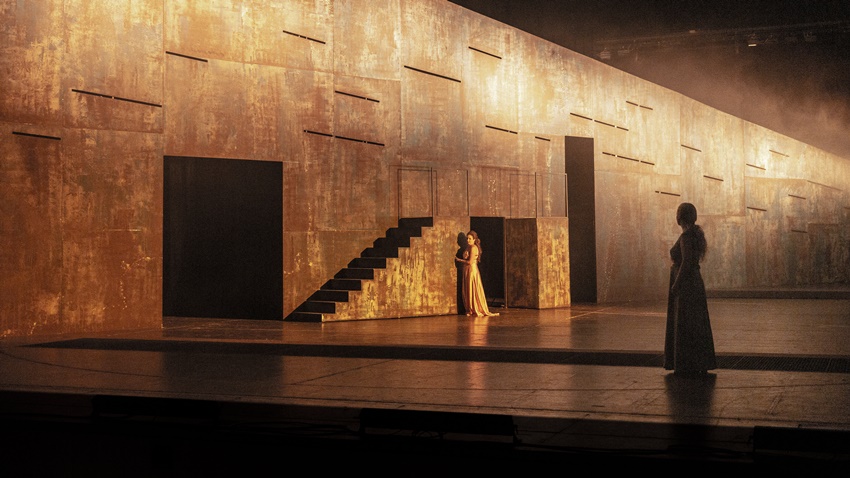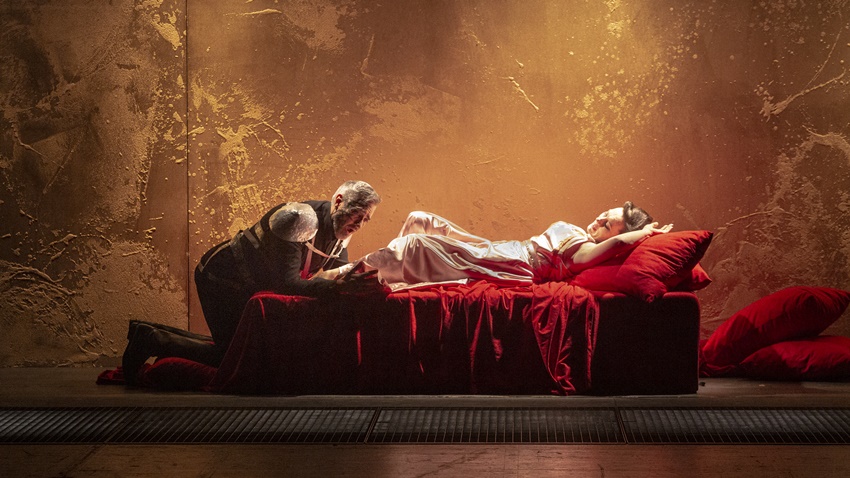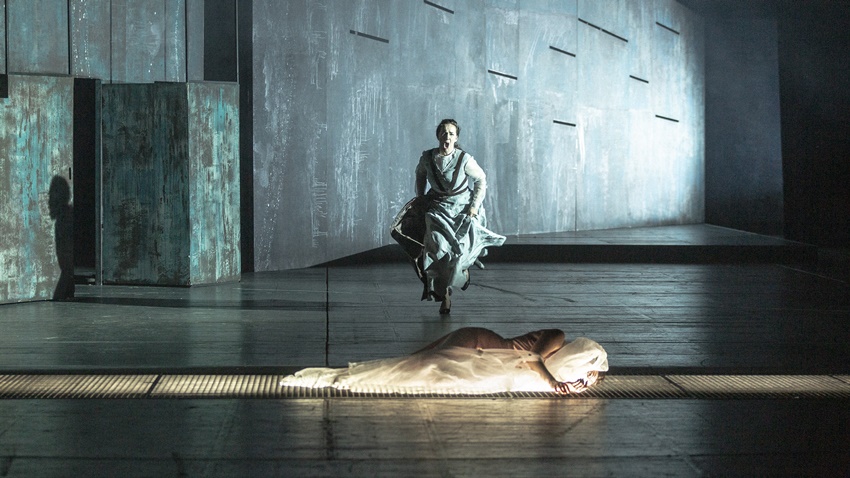An elaborate orchestral performance, an imaginative direction, a charming Desdemona, a miscast in the title role, and an accomplished but enervated Iago characterized the premiere of Otello at the Janáček Theatre in Brno.
Directed by Martin Glaser, the huge, elongated grey concrete block that fills the left side of the stage image has multiple functions. It can symbolize the ship on which Otello arrives gloriously, or the pier of the murky, misty harbour, but also the gloomy wall of the palace. The rest of the stage is also dominated by grey stones, the view of which is broken only by a few staircases. The latter, in addition to making the movements of the actors more diverse, often only make us guess who is coming from where and where they are going; the stairs lead 'nowhere'. The gesticulation of the singers (including the members of the choir) is free of mannerisms. The characters, wearing eclectic costumes, are mostly in motion, so the direction, which almost completely omits using any props, does not become static. The relationship between the actors is well developed, their character traits and motivations are clear. However, I noted with some disappointment that the spectacle remains the same, or at least similar, in each act and after each scene change; the greyness that determines the scenery thus becomes, after a while, monotonous. All the more refreshing is the sight of Otello and Desdemona's bedroom, a small 'jewelry box' of bright red and gold that rises from the depths of the stage in Act 1 and 4. The play of lights also make the stage image more diverse: the grey stones are sometimes lit by reddish or bluish colours. The choreography of the finale, which is not at all a simple task in terms of dramaturgy and the positioning of the characters, is also well-elaborated.
Of course, the schematic visual representation of the locations and the story only work well if the musical realization, the vocal performance and the acting can bring to life one of the most significant, if not the most significant Italian composer's late masterpiece in a nuanced and expressive way, with a high level of excellence, even with restrained visuals. In this respect, it was an uneven performance, the weak point of which was primarily the two male protagonists: Iago and especially Otello.
Dragutin Matić (Iago), Harold Meers (Otello), Jana Šrejma Kačírková (Desdemona),
and Václava Krejčí Housková (Emilia)
The American tenor Harold Meers sang Otello. This vocal part is one of the most demanding Italian dramatic tenor parts. It needs a heavy, powerful tenor voice with a baritonal quality and bright heights. Otello is a dream role for every Italian dramatic tenor; the greatest challenge that also requires a solid knowledge of style and, last but not least, mature acting. Of course, I do not expect the singer to have a 'volcano voice' like Mario Del Monaco had, but it is certain that lyric and even spinto tenors are not advised to undertake to sing it. I am aware that finding a singer that meets all the criteria is extremely difficult (and even more difficult today than it was 50 or 100 years ago), but it is a mystery to me why Harold Meers thought he was suitable for the role. His voice type is lyric, possibly lirico-spinto tenor. Already at his entrance, in 'Esultate', it became apparent that in this work his voice would be lost in the theatre, making the emblematic character of the Italian opera repertoire insignificant, with a little exaggeration. (What's more, it is a medium-sized theatre, and I am sure the conductor helped him too, holding back the orchestral fortes and fortissimos somewhat). In the lyrical scenes, such as Otello and Desdemona's romantic duet at the end of Act 1 as well as the closing aria, when Otello dies, he was more convincing. I am not saying Meers did not understand the role, and that he did not identify with the character at all. The problem is that I was less able to pay attention to his portrayal, precisely because the character was not given enough weight due to his vocal shortcomings. However, it was clear his Otello was not the bestial, aggressive warlord, but an insecure, easily influenced man with a tragic fate. Meer's voice is balanced, by the way, his top notes are secure, not to mention the attractiveness of the tall, handsome tenor. As a lyric tenor, he can achieve significant success without having to ruin his reputation (and possibly his voice) by singing roles that are not suitable for him.
Scene from the performance (with Giorgi Mtchedlishvili as Iago from the other cast)
Desdemona is not among Verdi's most complex female characters, but the rendition of the singer who shapes her can greatly contribute to the failure or success of the performance. Otello's spouse was beautifully portrayed this evening by Jana Šrejma Kačírková. The Czech soprano's beautifully arched legatos, brightly ringing heights and ethereal pianissimos were paired with sophisticated acting. Her Desdemona was sensitive and devoted, her naivety, pain, fright, frustration, and self-sacrifice were sincere. With her light-coloured yet mature, feminine timbre, she sang superbly in the duet at the end of Act 1, and she also sang her aria in Act 4 flawlessly. I admit, I usually find this scene a little too long. (I know this is a sacrilege, as we are talking about the famous 'Willow song' and 'Ave Maria'.) However, in the current production, with her nuanced performance and captivating stage presence, the singer was able to hold the attention of the audience throughout.
Harold Meers (Otello) and Jana Šrejma Kačírková (Desdemona)
I am a little baffled by the performance of Dragutin Matić, the Serbian baritone who impersonated Iago. The singer possesses the vocal quality that can make him suitable for interpreting Iago's part. He sings accurately and in style, his voice has a pleasant timbre and is balanced in every register. It lacks the necessary power, but the singer had some outstanding moments, for example, the sustained final note in 'Credo' in Act 2. (He also demonstrated his secure heights at the end of the act when he ended the Otello-Iago duet, 'Sì, pel ciel', with the tenor in unison, on an 'A' above middle C.) He also has good acting skills. However, his performance lacked energy and, above all, the necessary dedication. He was enervated, singing half-heartedly throughout the evening, making me feel as if he did not really want to be part of the production. Yet, although vocally the greatest challenge is Otello's part, the central figure in Verdi's work, the driving force behind the actions, is not the Moorish governor, but the intricate, clever, vile manipulator, Iago. (At the time of composing the work, the authors – Verdi and his librettist Boito – wanted to give the work the title Iago for a while, and not only to distinguish their opera from Rossini's Otello.) Too bad for all this, I am convinced that Dragutin Matić could do more.
Scene from the performance (with Pavla Vykopalová as Desdemona
and Jana Hrochová as Emilia from the other cast)
Among the comprimario roles, Aleš Briscein, with his clear diction, should be highlighted (who, by the way, was mostly more audible than the two male protagonists).
We also got qualified singers and fine actors in the person of Václava Krejčí Housková, who played Emilia, Petr Levíček, who sang Rodrigo, and Josef Škarka, who took the stage as Lodovico.
Interestingly, the second act quartet ('Dammi la dolce…') benefited musically by Harold Meers's paler tenor. It often happens the tenor or the soprano becomes too dominant in this scene, but now the quartet sounded extremely balanced (which was certainly because of the conductor's instructions as well). The vocal parts blended beautifully into each other, highlighting all the values of the quartet and giving me one of the most remarkable moments of the evening.
Conductor Robert Kružík excelled in keeping the orchestra together, which, apart from minor inaccuracies, produced a colourful, rich, expressive sound. The fortissimos of the overwhelming 'tempest music' ('Una vela! ... Esultate!') sounded with considerable force, the accurate pizzicatos of 'Fuoco di gioia!' depicted the crackling of the bonfire vividly, and the strings of 'Già nella notte' illustrated the atmosphere of Otello and Desdemona's love duet with gentle, warm colours. In the scene 'Dove guardi…', the instruments were waving gracefully along with the singing of the choir. The rendition of the diverse, complex orchestral material of 'Dio ti giocondi' was nuanced and sophisticated. The grievous music of 'Dio! mi potevi' was expressive, while during the playful, rhythmic melodies of 'Vieni, l'aula è deserta', the accuracy of the instruments should be highlighted again. Upon the arrival of the Venetian ambassador, the trumpets sounded with tight rhythms, followed by the grandiose performance of the already enormous ensemble with large-scale melodies, kept brilliantly under control by the conductor. At the beginning of Act 4, the quiet, sad, melodic sounds of the woodwinds were replaced by ominous music on Otello's entry – with the double bassists playing accurately and energetically – and the death of the Moorish ('Niun mi tema') was depicted by the orchestra sombrely and with dignity. The musically well-structured performance was characterized by varied dynamics and tempos, although I sometimes lacked even more definite contrasts.
Harold Meers (Otello) and Jana Šrejma Kačírková (Desdemona)
The choir sounded impressive, thanks in part to its well-established internal proportions. In the monumental third act, the voices filled the auditorium. However, the size of the choir was still not enough to make the first act really powerful (it should have been supplemented by additional singers). The gifted members of the children's choir, who sang with focus, are also to be praised.
Overall, despite its shortcomings, an exciting, high-quality performance was created, even if it did not reach the very high standard of the Greek passion (Martinů) and, in particular, The cunning little vixen (Janáček) I saw recently in Brno.
Balázs Csák
photo: Patrik Borecký
Václava Krejčí Housková (Emilia) and Jana Šrejma Kačírková (Desdemona)
*
June 17, 2022, Brno, Janáček Theatre
Giuseppe Verdi:
Otello
Opera in four acts, in Czech, with English and German surtitles
Libretto: Arrigo Boito
Set designer: Pavel Borák
Costume designer: Markéta Sládečková
Lighting designer: Martin Špetlík
Chorus master: Pavel Koňárek
Dramaturg: Patricie Částková
Directed by Martin Glaser
Cast:
Otello: Harold Meers
Iago: Dragutin Matić
Desdemona: Jana Šrejma Kačírková
Cassio: Aleš Briscein
Rodrigo: Petr Levíček
Lodovico: Josef Škarka
Montano: David Nykl
Emilia: Václava Krejčí Housková
Araldo: Kornél Mikecz
With the Orchestra and Choir of the National Theatre Brno
Conductor: Robert Kružík


